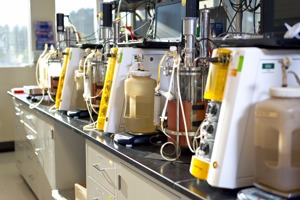ExxonMobil, Renewable Energy Group progress in biodiesel research
CLINTON, N.J. — ExxonMobil and Renewable Energy Group (REG) announced that by utilizing REG’s patented fermentation technology, the companies’ joint research program has demonstrated the ability to convert sugars from a variety of non-edible biomass sources into biodiesel.
During their initial research, the companies successfully validated the feasibility of the REG Life Sciences fermentation technology across multiple cellulosic sugar compositions produced with a variety of methods from various non-edible biomass sources. The research also confirmed REG Life Sciences technology is capable of achieving substantial reductions of full-lifecycle greenhouse gas emissions compared to traditional diesel fuel.
ExxonMobil signed an agreement with REG in January 2016 to study the production of biodiesel through fermentation of renewable cellulosic sugars from sources such as agricultural waste. The companies have agreed to extend the research program based on their positive findings and are excited to continue to jointly explore the technology’s potential for scalability.
REG Life Sciences has developed proprietary technology that relies on microbes to convert cellulosic sugars into biodiesel in a one-step fermentation process. Cellulosic feedstocks derived from agricultural waste, contain multiple types of sugars, including glucose and xylose, as well as impurities that can inhibit the fermentation process.
A breakthrough in cellulosic biodiesel production could have broad implications for the transportation sector. Global demand for transportation-related energy is projected to increase by about 25% through 2040, and accelerating the reduction in emissions from the transportation sector through technologies like biodiesel will play a critical role in reducing global greenhouse gas emissions.
ExxonMobil is also actively researching other emission-reducing technologies, including algae biofuels and carbon capture and sequestration. In June 2017, ExxonMobil and partner Synthetic Genomics, Inc. announced a breakthrough in joint research into advanced biofuels involving the modification of an algae strain that more than doubled its oil content without significantly inhibiting the strain’s growth.
In 2016, ExxonMobil announced its partnership with Connecticut-based FuelCell Energy, Inc. to advance the use of carbonate fuel cells to economically capture carbon emissions from natural gas power plants while generating hydrogen and additional electricity. Since 2000, ExxonMobil has spent about $8 B to develop and deploy lower-emission energy solutions across its operations.







Comments